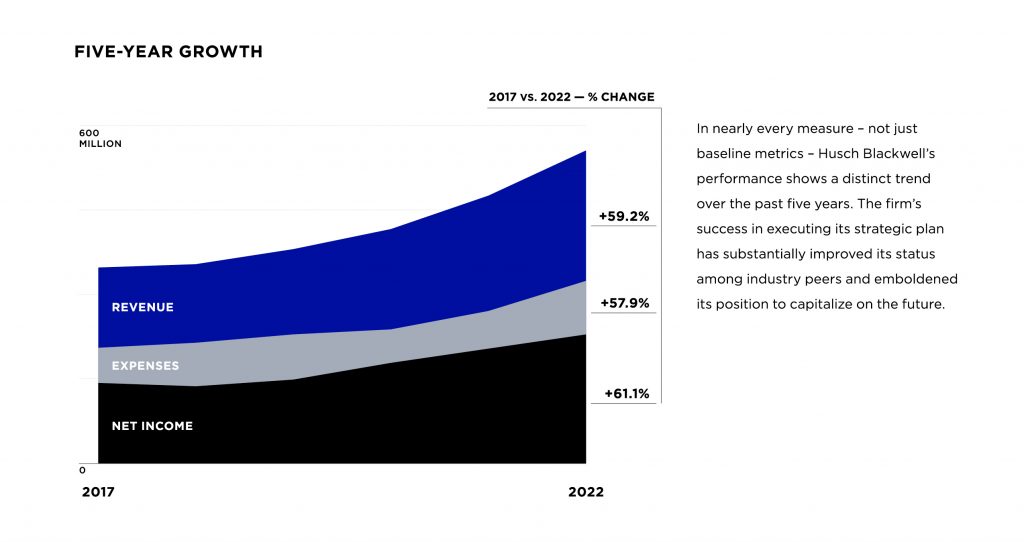What You Need to Know:
- The firm’s remarkable 2022 financial results earned a shoutout from The American Lawyer Editor Gina Passarella, who called Husch Blackwell a market “outperformer” for its double digit jump in the Am Law 100 2023 rankings and its record 16.6% organic revenue growth.
- Husch Blackwell’s uncommon approach stems from its strategic plan launched in 2012 to transform the firm by prioritizing transparency, innovation, and client experience.
- By “professionalizing” its business operation, overhauling an outdated compensation model, and embracing technology and innovation in the practice of law, Husch Blackwell achieved record financial success in the past five years.
Gregory Smith still remembers the time when he took on the role as Husch Blackwell’s first CEO. It was 2012 and the firm, which had fewer than 700 lawyers, was mostly known as a regional powerhouse in the Midwest. But Smith and his partners harbored an outsized ambition of breaking into the Am Law 100 and becoming a truly national brand that would provide sophisticated and high-end legal services to clients across the country.
The first step he undertook was to persuade his partners to overhaul the firm’s superstructure, dispensing with traditional practice areas and instead creating Strategic Business Units organized by industry. Those units would have profit/loss responsibility, operating budgets, and the final say on hiring and firing — a radical departure from the practice group structure that still dominates large law firms today.
“When the industry-centered model was first proposed, a lot of people looked at us as if we’d just landed from the other side of the moon,” recalled Smith. “But we made the case about the gaps that existed in the industry and what clients really valued about us, and it became clear that the industry structure — a commonplace in other professional services firms — could be a distinct advantage for us.”
The firm took the concept a step further by hiring non-practicing lawyers and highly experienced business professionals to co-lead the groups and empowering them to make key operational and strategic decisions about how the groups would function and serve clients.
“There is something to be said for the level of focus someone brings to the business when not burdened by the demands of maintaining a day-to-day legal practice,” said Angela Quinn, who currently serves as the firm’s Chief Client Officer. Quinn began her career as a practicing lawyer, ascending to partner before leaving her legal practice behind in 2016 to become the firm’s first managing director of the newly created healthcare business units.
The mindset of empowering a highly professionalized staff permeated every aspect of the firm’s operations, notably information technology, accounting, pricing, diversity, and marketing. The culmination of this approach was the appointment in 2018 of Paul Eberle, a veteran business executive with extensive experience in the technology sector, as the firm’s CEO, succeeding Smith who took on the title of firm chairman.
The move was historic as Eberle became the first and only leader of an Am Law 100 law firm who wasn’t a lawyer by training.
“We operate as one office, lawyers and business professionals working together to bring value to clients,” said Eberle. “I believe this was, and still is, our great differentiator.”
A New Compensation Model: Aligning Incentives to Outcomes
In parallel to the creation of Strategic Business Units, the firm also launched a new attorney compensation model that ended the traditional system of origination credits – also known as “eat what you kill”– that tend to stifle partner collaboration.
“The idea was to get transactional lawyers, litigators, and regulatory lawyers to collaborate with one another in service of better client solutions,” said J.Y. Miller, managing partner of the firm’s virtual office, The Link. “That required creating a system that rewarded sharing and the achievement of client outcomes. Everything we’ve built since then flows from those decisions.”
Today, the new compensation model, which gives incentives to all lawyers at every point of client contact and not just origination, has contributed to the tremendous growth in collaboration across business units tasked with enhancing client experience, according to Quinn. In addition to rewarding relationship managers, the firm also rewards lawyers who act as service line leaders, as well as as those who are able to expand the services the firm offers clients (proliferation leaders), and lawyers who successfully transition matters to next generation client leaders.
“At other firms, you will see that partners are protective of their client relationships and want to be the gatekeepers of all communication. It hampers the ability to deliver a positive customer experience. Our compensation model ensures cooperation in many areas of the customer relationship that enhance service delivery,” said Quinn.
Numbers Don’t Lie: Market “Outperformer”
In its 2023 Am Law 100 rankings, released April 18, The American Lawyer recognized Husch Blackwell as one of only 23 firms to post growth across revenue, net income, profits per partner, revenue per lawyer, and headcount in 2022. Rising 10 spots on the Am Law 100 list to 81, Husch Blackwell outpaced peers and competitors in 2022 and reported 16.6% revenue growth compared to an average growth of 2.7% for the Am Law 100. The firm is also one of only five to have increased in revenue, net income, profits per partner, revenue per lawyer, and headcount every year since 2018.


The firm’s remarkable 2022 financial results earned a shoutout from The American Lawyer Editor Gina Passarella who highlighted Husch Blackwell among a handful of market “outperformers” during the launch of the 2023 Am Law 100 rankings. Jae Um, an industry analyst, also noted that the firm is growing in a “healthy way” by all measures and is positioned for continued growth and success.
“The legal industry saw tremendous growth in 2021, but 2022 saw many firms unable to repeat the previous year’s gains,” explained Eberle. “Our success comes from aligning everything we do to our clients’ interests, including our compensation model, our embrace of alternative fees and strategic pricing, our industry-driven structure, and our ongoing investment in the talent experience.”
Husch Blackwell Chair Catherine Hanaway says the firm’s remarkable five-year organic growth streak was a decade in the making – and shows no signs of slowing down.
“When I’m pitching the firm to recruits and business connections, I could lead with the numbers— they are impressive by any measure — but it all traces back to the amazing culture we have developed over the past decade or so,” said Hanaway. “We always had faith that if we executed on the plan we developed, the financial performance would follow, so we have been meticulous in the follow-through and holding each other accountable.”



